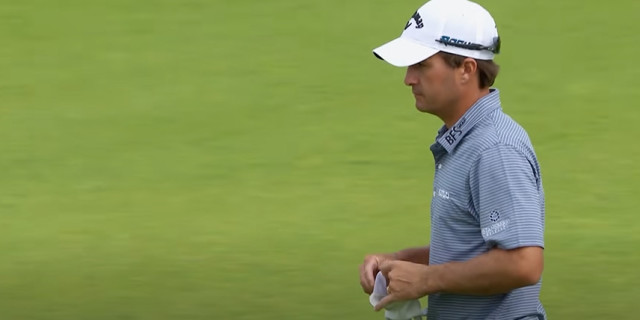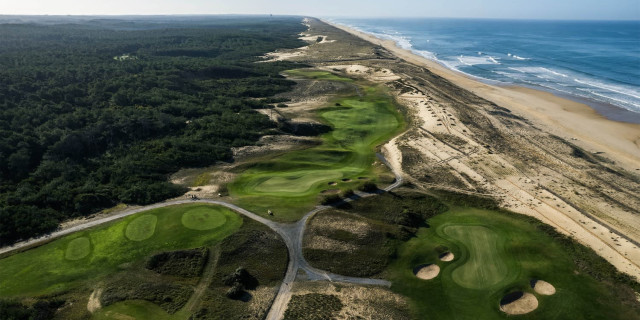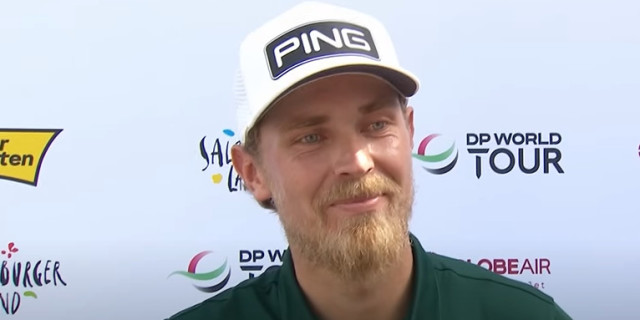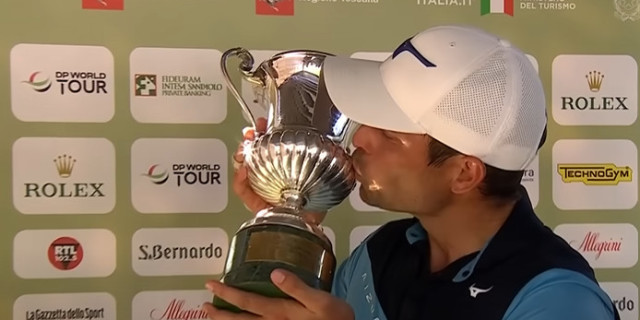
Golfers Who You Forgot Finished Second at The Open
It's often been said in sport that everyone remembers the winner and no one remembers who finished second, but that isn't strictly true when you think of the Open Championship.
We can all recall Jean van de Velde at Carnoustie in 1999 or Doug Sanders (and THAT putt) in 1970 at St Andrews, or more recently Phil Mickelson's thrilling - but ultimately unsuccessful - battle with Henrik Stenson at Royal Troon in 2016. And take your pick from any of the SEVEN times that Jack Nicklaus was runner-up in the game's oldest major.
And no one will forget 59-year-old Tom Watson's agonising loss to Stewart Cink at Turnberry 15 years ago.
Featured Content
The runner-up in a major - and especially the Open - is often as much a part of the story as the eventual Champion Golfer of the Year.
However, there are some near-contenders who you may have perhaps forgotten about. Brian Harman dominated at Royal Liverpool last year, but it was Jason Day, Tom Kim, Jon Rahm and Sepp Straka who all tied for a distant second. Those finishes might become forgettable as time passes into the future.
We have taken a look through the history books to pick out some runner-ups who didn't rival the winner for attention.
Cameron Young (2022)
It was Cameron Smith whose extraordinary back-nine will go down in St Andrews legend, but given how much attention was placed on a painful loss for Rory McIlroy that day, it's easy to forget that it was actually Cameron Young who finished second. The American - playing with Smith - kept pace with the Australian on that balmy Sunday, ultimately closing with a sensational eagle on the 18th that forced the Aussie to hole his short putt for a one-shot victory.
Kevin Kisner (2018)

Kisner had just two PGA Tour wins to his name before the Open at Carnoustie, but the American was tied for the lead after 54 holes and restored himself to that position with a birdie on the 10th during the final round. However, like Rory McIlroy, Justin Rose and Xander Schauffele, Kisner wasn't able to close the gap on Francesco Molinari, who secured the Claret Jug for Italy.
Chris DiMarco (2006)
During this time, DiMarco was seemingly a constant contender in the majors, but while his playoff loss to Tiger Woods at the Masters in 2005 has been etched in history, his finish at Royal Liverpool in 2006 is less freely recalled. Ernie Els and Sergio Garcia both faded away on that final day, but it was DiMarco who pushed Woods on the sun-baked links at Hoylake, finishing second just weeks after his mother had died suddenly.
Vijay Singh (2003)
Ben Curtis was one of the least likely winners in Open history - succeeding on his major debut - and many remember this championship for Thomas Bjorn's disastrous finish, including a double bogey on the par 3 16th, which cost him the title. Davis Love and Tiger Woods were right there too, but it was Vijay Singh who quietly joined Bjorn in the runner-up spot that year.
Thomas Levet (2002)
The Frenchman was part of a winning Ryder Cup team in 2004 and memorably won his home title at Le Golf National in 2011, but he also could have won the Open at Muirfield in 2002. Making an eagle on the 17th to secure a playoff place alongside Ernie Els, Stuart Appleby and Steve Elkington, it was Levet who tied Els after the four extra holes, which led to another visit to the 18th that Levet bogeyed for a second time in just a few minutes, ending his chance of becoming the first golfer from France to win since Arnaud Massy in 1907.
Niclas Fasth (2001)
This Open is recalled for David Duval's sensational weekend display and the disastrous, costly ruling Ian Woosnam received for having too many clubs in his bag, but it was Sweden's Niclas Fasth (in his major debut) who took second place behind the American former world number one. Fasth was later part of Europe's winning Ryder Cup team in 2002.
Justin Leonard (1999)
The 1999 Open remains unforgettable for the fierce test presented by Carnoustie, the brilliance of Paul Lawrie's final day, and the shocking spectacle of Jean van de Velde's seven on the last hole. But no one talks about Justin Leonard - the champion of 1997 - who was also part of that playoff. But, like the Frenchman, the American was no match for the Scotsman in those extra holes.
Brian Watts (1998)
Reminiscent of Todd Hamilton at Royal Troon in 2004, Watts was an American who had played mainly in Japan, winning often and earning significant money, but without achieving wider recognition. That was until Royal Birkdale in 1998, when he led after three rounds and found himself in a playoff with Mark O'Meara, the Masters champion. It was ultimately the more experienced man who triumphed and Watts was left to ponder what might have been.
Mark McCumber (1996)
Tom Lehman held a commanding lead after three rounds at Royal Lytham, with the expected challenge set to come from second-placed Nick Faldo. But it was Ernie Els and Mark McCumber who made a charge. The latter, a former winner of the Players Championship, was almost 45 and would have been the oldest champion since Old Tom Morris in 1867. McCumber finished two shots behind his compatriot, Lehman.
Wayne Grady (1989)
The 1989 Open at Royal Troon is now remembered for Greg Norman's disaster on the last hole of the playoff, which opened the door for Mark Calcavecchia to be victorious. Norman had shot a final round of 64 that day to charge up the leaderboard, but it was his fellow Australian, Wayne Grady who had led after 54 holes and who also found himself in that playoff, finishing three shots behind an inspired Calcavecchia. Grady later won the PGA Championship and viewers in the UK will recall his years commentating for the BBC.
Rodger Davis (1987)
It was the year when Nick Faldo parred all 18 holes at Muirfield on a grim day to edge ahead of Paul Azinger, who had led by three shots at the turn. However, what is less mentioned, is that Australia's Rodger Davis (and his fabulous moustache) came through the pack to join Azinger in second place.
Gordon J Brand (1986)
Greg Norman won his first Open at Turnberry in 1986 and the names on the leaderboard included Bernhard Langer, Ian Woosnam, Nick Faldo and Seve Ballesteros. But it was England's Gordon Brand who was an unlikely runner-up.
Andy Bean (1983)
The American enjoyed a fantastic PGA Tour career - winning 11 times - but he might have felt like the 1983 Open at Royal Birkdale should have been his, with a closing 67 seeing him finish in a tie for second alongside Hale Irwin, just one shot back of the imperious Tom Watson, who successfully defended the Claret Jug.
Simon Owen (1978)
The 1978 Open Championship was a proud victory for the great Jack Nicklaus - finishing two ahead of four players at St Andrews, including major winners Raymond Floyd, Tom Kite and Ben Crenshaw. But among that runner-up group was comparatively unheralded New Zealander Simon Owen, who was playing with Nicklaus that day and led the legendary American by one with just three holes to play, but bogeys on the 16th and 17th (aligned with Nicklaus' birdie on 16) turned the tide towards the Golden Bear.
Frank Stranahan (1947 & 1953)
Bobby Jones in 1930 remains the last amateur to win the Open, but Frank Stranahan could have changed that. Born in Ohio to a millionaire father, the American was a supreme athlete, pioneering the importance of fitness in golf long before Gary Player. And he twice finished runner-up, to Fred Daly in 1947, and Ben Hogan at Carnoustie in 1953.
Related Content
The Open 2024 Preview, Picks & Analysis
10 Outsiders to Watch at The Open 2024
Legendary Open Championships at Royal Troon
Was This The Best Open Championship Ever

The oldest & most prestigious major, a trip to The Open is a must for every golf fan. From tickets and transfers to hospitality & golf, Golfbreaks.com can build the perfect package to help you experience The Open in style.
Tags: The Open Championship The Open Royal Troon









